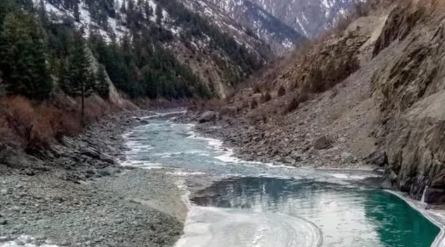The decision comes in the aftermath of Jammu and Kashmir’s Pahalgam terror attack which claimed the lives of at least 26 lives and left several others injured.

Indus Water Treaty: India on Thursday officially informed Pakistan that the decades-old Indus Waters Treaty is being held in abeyance “with immediate effect” citing the neighbouring country’s sustained cross-border terrorism targeting Jammu and Kashmir.
The decision comes in the aftermath of Jammu and Kashmir’s Pahalgam terror attack which claimed the lives of at least 26 lives and left several others injured.
Jal Shakti Ministry’s Secretary Debashree Mukherjee has sent a formal letter to her Pakistani counterpart, Syed Ali Murtaza, informing the Government of India’s decision to place the Indus Waters Treaty 1960 in abeyance, marking a major escalation in regional water diplomacy.
India said that sustained cross-border terrorism has impeded its rights under the Indus Waters Treaty.
“The obligation to honour a treaty in good faith is fundamental to a treaty. However, what we have seen instead is sustained cross-border terrorism by Pakistan targeting the Indian Union Territory of Jammu and Kashmir,” the letter read.
The letter highlighted multiple shifts, including dramatic changes in population demographics and India’s push toward clean energy, which have altered the foundational assumptions of the agreement.
India further said that Pakistan has refused to respond to its request to enter into negotiations as envisaged under the treaty.
“The resulting security uncertainties have directly impeded India’s full utilisation of its rights under the Treaty. Furthermore, apart from other breaches committed by it, Pakistan has refused to respond to India’s request to enter into negotiations as envisaged under the Treaty and is thus in breach of the Treaty,” the letter read.
Concluding the letter, Mukherjee declared, “The Government of India has hereby decided that the Indus Waters Treaty 1960 will be held in abeyance with immediate effect.”
India has announced downgrading diplomatic ties with Pakistan and suspended the Indus Waters Treaty with Pakistan in the aftermath of the Pahalgam carnage on Tuesday in which 26 tourists were shot dead in broad daylight by the Resistance Front terrorists, an offshoot of Lashkar-e-Taiba (LeT).
The decision was taken during the meeting of the Cabinet Committee of Security (CCS) chaired by Prime Minister Narendra Modi.
Pakistan’s Reaction To India’s Decision
Earlier today, Pakistan’s National Security Committee had said any attempt by India to block or divert river water under the Indus Waters Treaty would be treated as an “Act of War”. Terming the 1960 agreement a lifeline for its 240 million citizens, Islamabad claimed the treaty cannot be held in abeyance unilaterally and warned of retaliation “across the complete spectrum of National Power”.
Pakistan appeared to take into account that if India holds the IWT in abeyance it might not bode well for its citizens. Protests have erupted across Pakistan following its inadequate response to the droughts which have occurred across Sindh, Balochistan and Punjab provinces.
What Is Indus Waters Treaty?
India and Pakistan signed the Indus Waters Treaty in 1960, with the World Bank as an additional signatory. The pact sought to divide the water of the Indus river and its tributaries equitably between the two countries. Under the treaty, water from three eastern rivers—Beas, Ravi, and Sutlej—was allocated to India, and that from the three western rivers—Chenab, Indus, and Jhelum—to Pakistan.









